-
New method to rid inboxes of unsolicited e-mail
Spam used to be text-based, but has recently turned high-tech, using layers of images to fool automatic filters; thanks to some sophisticated new cyber-sleuthing, researchers at are working toward a cure
-
-
Humble microbes fighting harmful greenhouse gas
The environment has a more formidable opponent than carbon dioxide; another greenhouse gas, nitrous oxide, is 300 times more potent and also destroys the ozone layer each time it is released into the atmosphere through agricultural practices, sewage treatment, and fossil fuel combustion; luckily, nature has a larger army than previously thought combating this greenhouse gas
-
-
Warming to shift heavy rainfall patterns across U.K.
Researchers investigating the potential changes in extreme rainfall patterns across the United Kingdom as a result of global warming have found that in some regions of the country, the time of year when we see the heaviest rainfall is set to shift
-
-
Greenhouse gas concentrations in the atmosphere reach new record
The amount of greenhouse gases in the atmosphere reached a new record high in 2011, according to the World Meteorological Organization (WMO); between 1990 and 2011 there was a 30 percent increase in radiative forcing — the warming effect on our climate — because of carbon dioxide (CO2) and other heat-trapping long-lived gases; a new WMO Greenhouse Gas Bulletin highlights pivotal role of carbon sinks
-
-
Learning the lessons of the BP oil spill
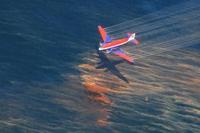
In an attempt to limit the harm of the Deepwater Horizon oil spill in the Gulf of Mexico in 2010, three million liters of dispersant were used to dissipate the oil; on the surface the damage seems limited, but the seabed is covered with a thick layer of gunk; scientist from around the world are now working on models that can be consulted by decision makers when there is another oil spill disaster
-
-
Combining CO2 storage with enhanced oil recovery can aid U.K. economy
Combining carbon storage with enhanced oil recovery techniques in key fields could generate up to 2.7 billion pounds in extra economic output; if a combination of carbon storage and enhanced recovery techniques is fully exploited, it is estimated that nineteen potentially suitable oil fields on the U.K. Continental Shelf (UKCS) could contribute 15 percent of all UKCS oil production by 2030
-
-
“Soft infrastructure” as storm surge defense alternatives
The flooding in New York and New Jersey caused by Superstorm Sandy prompted calls from Governor Andrew Cuomo and other officials to consider building storm surge barriers to protect Lower Manhattan from future catastrophes. Such a strategy, however, could make things even worse for outlying areas that were hit hard by the hurricane, such as Staten Island, the New Jersey Shore, and Long Island’s South Shore, a City College of New York landscape architecture professor warns; landscapers and engineers say that environmentally friendly “soft infrastructure” would mitigate flood damage without sending harm elsewhere
-
-
Chemists convert greenhouse gas to fuel
What if you could take greenhouse gas and convert it to fuel for an energy-hungry world? Scientists, using modern genetics, accomplished exactly this; the researchers’ findings are just a first step toward converting carbon dioxide, one of the most abundant emissions from fossil fuel use, into usable hydrocarbons
-
-
The world’s 300 000 glaciers are melting, causing sea level to rise
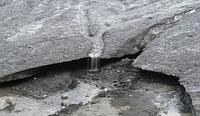
Anthropogenic climate change leads to melting glaciers and rising sea level; between 1902 and 2009, melting glaciers contributed eleven centimeters to sea level rise; they were therefore the most important cause of sea level rise; the scientists numerically modeled the changes of each of the world’s 300 000 glaciers
-
-
How groundwater pumping affects streamflow
Groundwater provides drinking water for millions of Americans and is the primary source of water to irrigate cropland in many of the nations most productive agricultural settings; although the benefits of groundwater development are many, groundwater pumping can reduce the flow of water in connected streams and rivers — a process called streamflow depletion by wells; new USGS report describes processes and misconceptions concerning the effects of groundwater pumping on streamflow
-
-
Snowpack, essential freshwater source for billions, threatened
Snowpack, an essential source of drinking water and agricultural irrigation for billions of people, could shrink significantly within the next thirty years; the news is particularly troubling for snowpack-dependent California — the largest producer of agriculture products in the country and the sixth-largest agriculture exporter in the world; by filling reservoirs and watering crops when warmer, drier weather sets in, mountain snowpack has become vital to people and ecosystems in regions such as the Western United States, Alpine Europe, Central Asia, and downstream of the Himalayas and Tibetan Plateau — home to more than 50 percent of the world’s population
-
-
Himalayan glaciers to shrink even if temperatures hold steady, risking South Asia water supply
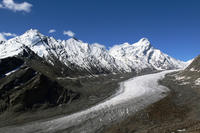
Come rain or shine, or even snow, some glaciers of the Himalayas will continue shrinking for many years to come; the most conservative findings of a new research on Bhutan, a region in the bull’s-eye of the monsoonal Himalayas, indicate that even if climate remained steady, almost 10 percent of Bhutan’s glaciers would vanish within the next few decades; what is more, the amount of melt water coming off these glaciers could drop by 30 percent
-
-
U.S. electric power grid “inherently vulnerable” to terrorist attacks: report
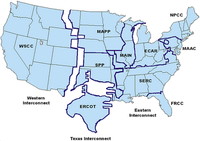
The U.S. electric power delivery system is vulnerable to terrorist attacks which could cause much more damage to the system than natural disasters such as Hurricane Sandy, blacking out large regions of the country for weeks or months, and costing many billions of dollars, says a newly released report by the National Research Council
-
-
Con Ed overcame many obstacles to restore power to NYC
On 29 October Hurricane Sandy slammed into New York City and took out the power in most of Lower Manhattan, even knocking out power to the headquarters of Consolidated Edison’s (Con Ed), the electricity supplier for NYC; due to the flooding in Lower Manhattan, employees had to use rafts to rescue coworkers trapped in the company’s East 13th Street power station; in the days after the storm, as with many other New Yorkers, Con Ed almost ran out of gas, but that did not stop the company from restoring power back to Lower Manhattan less than four days after the storm
-
-
Hurricane Sandy caused dramatic changes to hundreds of miles of East Coast shoreline
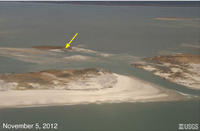
The United States Geological Survey (USGS) has released a series of aerial photographs showing before-and-after images of Hurricane Sandy’s impacts on the Atlantic Coast; the photos, part of a USGS assessment of coastal change from as far south as the Outer Banks of North Carolina to as far north as Massachusetts, show that the storm caused dramatic changes to portions of shoreline extending hundreds of miles
-
More headlines
The long view
Water Wars: A Historic Agreement Between Mexico and US Is Ramping Up Border Tension
As climate change drives rising temperatures and changes in rainfall, Mexico and the US are in the middle of a conflict over water, putting an additional strain on their relationship. Partly due to constant droughts, Mexico has struggled to maintain its water deliveries for much of the last 25 years, deliveries to which it is obligated by a 1944 water-sharing agreement between the two countries.
Trump Is Fast-Tracking New Coal Mines — Even When They Don’t Make Economic Sense
In Appalachian Tennessee, mines shut down and couldn’t pay their debts. Now a new one is opening under the guise of an “energy emergency.”
Smaller Nuclear Reactors Spark Renewed Interest in a Once-Shunned Energy Source
In the past two years, half the states have taken action to promote nuclear power, from creating nuclear task forces to integrating nuclear into long-term energy plans.
Keeping the Lights on with Nuclear Waste: Radiochemistry Transforms Nuclear Waste into Strategic Materials
How UNLV radiochemistry is pioneering the future of energy in the Southwest by salvaging strategic materials from nuclear dumps –and making it safe.
Model Predicts Long-Term Effects of Nuclear Waste on Underground Disposal Systems
The simulations matched results from an underground lab experiment in Switzerland, suggesting modeling could be used to validate the safety of nuclear disposal sites.
